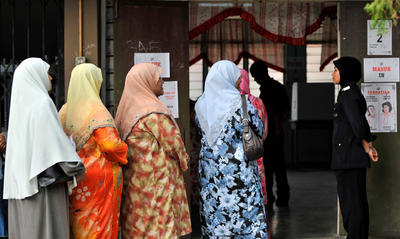But this could change in this election as 45 state seats and 14 parliamentary constituencies are up for grabs.
The population of Kelantan is 95 per cent Malay-Muslim, which is why the seats are usually a contest between the traditionally Malay-Muslim PAS and United Malays Nationalist Organisation (UMNO) parties. Some 900,000 people are expected to cast their votes with 150,000 of them working in urban areas outside Kelantan.
PAS has been in power for a total of 42 years. For a brief period between 1973 and 1978 it was part of the UMNO-led Barisan Nasional (BN) coalition. But in more recent years it has been a member of the opposition federal coalition Pakatan Rakyat (PR). In 1990, PAS swept clean all 39 state seats, and since then PAS has held on to Kelantan.
The BN coalition, which holds federal government, has performed poorly in elections in Kelantan. The one exception was in 2004 when it won 21 state seats. This was mainly due to the positive voter sentiment that accompanied the rise of Prime Minister Abdullah Ahmad Badawi.
Economic development has always been a popular issue in elections, especially in the poorer Malaysian states like Kelantan. One cause championed by PAS relates to oil royalties, which it claims are being unfairly withheld by the federal government. Yet the PAS state government claims its economic growth in recent years is higher than the national average, although some estimates put the figure at an average of 3 per cent annually.
BN’s approach to economic development is to offer the Kelantanese a lot of economic investments, such as a new highway and a university. But, though these investments may be attractive, voters will be considering many other issues.
PAS has an advantage over BN because of PAS’s Islamic roots. While PAS’s economic development is lagging behind many other states, the party commands a higher degree of legitimacy than the ruling parties because its leaders are seen to be more religiously upright. One of the major reasons for PAS’s persistent success in Kelantan is its chief minister, Nik Abdul Aziz Nik Mat, who is regarded as a pious leader by his followers. BN, on the other hand, is trying to compete on the piety issue with the promise of a grand new mosque. Another one of PAS’s advantages is its policy of restrained consumption which contrasts with BN’s perceived extravagance.
So PAS’s appeal is likely to remain high among Malay-Muslim voters in Kelantan. And the party’s close relationship with the federal opposition coalition, PR, appeals to conservative voters as indicated by the 2008 election results. In recent years, PAS has appeared to be more open than the secular UMNO party (a major party in the BN coalition), but this newer image is balanced out by the more conservative elements within the party, and even cancelled out at times by PAS’s stance on religious issues.
Yet all is not lost for BN’s UMNO. After all, it almost took control of the state in 2004. In the 2008 elections, its poor showing was due to the UMNO state leadership being cast aside. The factions seem to have reconciled over time but internal politicking has always been UMNO’s Achilles’ heel. There has also been talk of UMNO stalwart Tengku Razaleigh’s newly formed group Amanah being a potential kingmaker in the upcoming election.
The numbers give BN some grounds for hope as it still maintains sizeable Kelantanese support, and a small swing in their favour may be sufficient for victory.
Another cause for BN optimism is the Chinese vote. In the six Chinese-dominated state seats Prime Minister Najib Razak’s ‘1Malaysia’ policy might sway the voters to BN’s camp. Although PAS is keen to promote its newer image, its controversial stance on several religious issues may drive away non-Muslim support from the Pakatan Rakyat coalition of which it is a part.
The political parties are already geared up for what promises to be one of the most intense elections in Malaysia’s history. Some estimates have projected the UMNO-led BN to beat the opposition narrowly in terms of total parliamentary seats won. Even in Kelantan, where BN is less popular, an above-average performance could snatch Kelantan away from PAS and return the coalition to Putrajaya at the federal level.
Kelantan is the litmus test for PAS — whether or not the changes brought by its alliance with the opposition coalition have been beneficial or to its disadvantage. Either way, the outcome in Kelantan will be critical in this coming general election.
Afif Pasuni is Associate Research Fellow in the Malaysia Program at the S. Rajaratnam School of International Studies (RSIS), Nanyang Technological University.
A version of this article was first published here in RSIS Commentaries.

